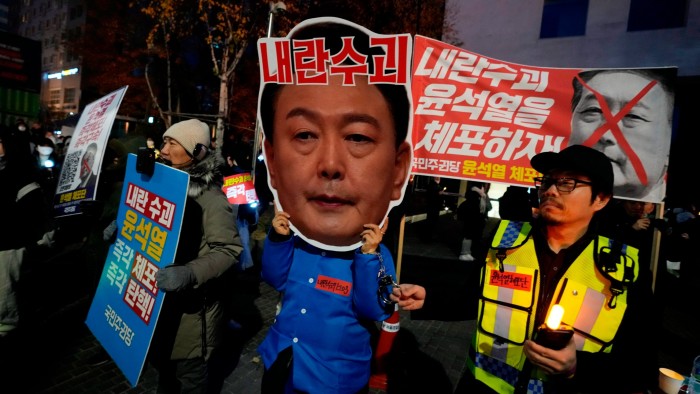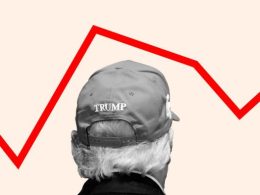Joe Biden boasted that the US, Japan and South Korea had “made history” when the leaders of the three countries held their first-ever trilateral summit at Camp David last year.
The meeting could not have taken place without South Korea’s Yoon Suk Yeol, a staunch US supporter who steered rapprochement with Japan while taking a more hawkish stance than his leftwing predecessors towards China and North Korea.
With Yoon now facing impeachment after he tried and failed to introduce martial law, there are questions over whether a new government in Seoul — likely from the other end of the political spectrum — might complicate Washington’s efforts under Donald Trump to counter the rise of China as a military superpower, according to diplomats, officials and analysts.
“The creation of a trilateral security co-operation structure with the US and Japan is the most likely target of an incoming leftwing government, and I think it is quite likely it will be rolled back,” said Daniel Sneider, a lecturer in east Asian studies at Stanford University.
“The fact that Trump has shown no interest in that kind of allied effort will make it all the more easy for the South Korean left to back out of this structure.”
Yoon’s foreign policy stance has been castigated by the leftwing opposition Democratic party (DPK) and its leader Lee Jae-myung, the frontrunner to replace Yoon in the event of the president’s early departure.
Lee, who is also expected to pursue a more conciliatory line with North Korea and Russia and rule out the possibility of arms supplies to Ukraine, has described South Korea’s diplomatic rapprochement with Japan under Yoon as “the most shameful and disastrous moment in our country’s diplomatic history”.
The opposition leader also courted controversy last year by making a joint public appearance with China’s then-ambassador to South Korea when the two countries’ relations were in crisis following Yoon’s suggestion that Beijing was responsible for tensions in the Taiwan Strait.
In March, Yoon’s conservative People Power party accused Lee of taking a “subservient” attitude towards China when he told a campaign rally that South Korea should say “xie xie” — “thank you” in Mandarin — to China instead of upsetting Chinese consumers with hostile diplomacy.
“Lee and the DPK can be described as pro-China because they see improving ties with Beijing as a prerequisite for improving relations with the North,” said Jaewoo Choo, head of the China Center at the Korea Research Institute for National Security think-tank in Seoul.
A senior Japanese government official who spoke on the condition of anonymity noted that “good and improving” relations between Tokyo and Seoul had only been in place for about two years. The Japanese side did not want to return to the strained ties that characterised much of the five years under Yoon’s leftwing predecessor Moon Jae-in, they added.
“We consider what has happened over the past few days in South Korea as very negative,” the official said.
Sneider said that while there was “broad support” in South Korea for the restoration of normal relations with Japan, Yoon’s diplomatic breakthrough with Tokyo, which involved Seoul paying compensation to Korean victims of Japanese wartime forced labour practices, had been built on shaky foundations.
“Yoon opted for a unilateral compensation scheme when the Japanese government balked at contributing to that settlement,” said Sneider. “That fed the perception that Korea had made concessions without Japan offering a reciprocal effort.”
Yoon, whose approval ratings frequently touched historic lows at home, was feted in the US after his rendition of “American Pie” at a state dinner in Washington last year. Speaking at a “Summit for Democracy” in Seoul in March, US secretary of state Antony Blinken described South Korea as “a champion of democracy for the world”.
Foreign diplomats and officials are now questioning whether they overlooked Yoon’s antidemocratic tendencies. “Conservative politicians in Asia tend to get a pass in Washington because they embrace the language and identity of being ‘pro-American’ and ‘pro-alliance,’” said John Delury, an expert on Asian politics and visiting professor at Luiss University in Rome.
The issue now is what will happen under Trump, who analysts note frequently rattled the two US allies by threatening to withdraw US troops from Japan and the Korean peninsula.
Zack Cooper, an Asia security expert at the American Enterprise Institute, said: “As a conservative leader of a critical country who is engaging and speaks English well, Yoon . . . was perfectly positioned to build a productive relationship with Donald Trump.
“His potential departure, or domestic weakness if he stays, will now leave Seoul in a difficult position,” Cooper added. “I think this opens up the door for substantial US troop reductions from South Korea.”
Shen Dingli, a Shanghai-based academic and expert in China-Korea ties, said China would not necessarily expect significantly warmer ties under a different leader, including Lee. Moon, Yoon’s predecessor, ultimately backtracked on campaign promises to prevent the deployment of the US’s Terminal High Altitude Area Defense anti-ballistic missile system, which China opposed, he noted.
A former adviser to the US military in South Korea argued that the US-led “reshaping” of the region’s economic, defence and technology supply chains away from China would continue regardless of who was next in power in Seoul.
“The reality is the geostrategic environment in which we live today will constrain historical proclivities by the political left in South Korea to shift too far away from the United States and like-minded countries to align much more closely with China,” they said.
Source link









